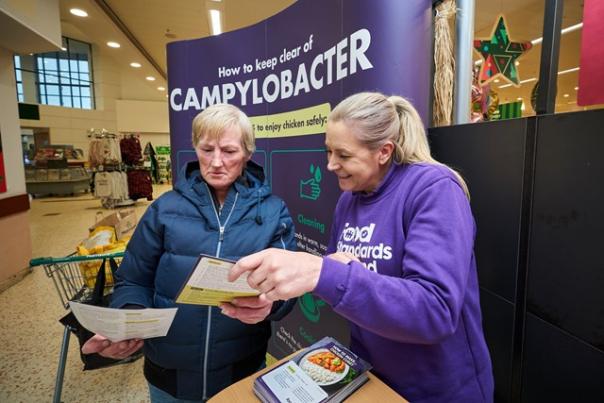
The most common cause of food poisoning in Scotland, campylobacter’s effects can be serious with the most severe cases resulting in hospitalisation or death. Over 65s find themselves most at risk, due to lowered immune systems, from the bug.
With the bulk of cases involving the preparation of chicken, Food Standards Scotland (FSS) teamed up with retailers Morrisons and Scotmid, plus Bield, Cairn and Caledonia housing and care providers, to highlight four easy to follow steps to prevent illness. Diarrhoea, headaches and vomiting are all symptoms of campylobacter.
Jim Carson, Catering Manager at Bield, said: “It’s been a difficult few years for our tenants as face-to-face contact has had to be kept at a minimum. It’s been great to welcome members of FSS into our properties and hear them share this message about the prevention of campylobacter.
“We know this kind of food poisoning is common but its effects can be a lot more serious in over 65s. That’s why our involvement in this campaign and letting our tenants hear the steps they can take to prevent it is so important to us."
Known as the 4Cs, these measures were outlined to the public through a series of campylobacter roadshows in Morrisons stores in Glasgow, Edinburgh, Dundee, Falkirk and Inverness. All FSS’s partners played an important role in sharing the 4Cs message with staff also visiting residents in Bield accommodation.
Fiona Sullivan, Senior Corporate Services Manager Food from retailer Morrisons, said the FSS message was well received in stores. She added: “Morrisons is delighted to support Food Standards Scotland in raising awareness of campylobacter and the simple preventative steps our customers can take to ensure safe food preparation.
“The roadshow of eight events in our stores has been a huge success, with customers responding especially well to the chicken curry recipe, which included details of the campaign’s important 4Cs messaging."
The 4Cs, Chilling, Cleaning, Cooking and avoiding Cross-contamination are all factors in helping to keep you safe.
Chilling: Defrost chicken in the fridge in a covered container on the bottom shelf away from cooked foods. Always check chicken is fully defrosted before cooking.
Cleaning: Always wash hands in warm, soapy water after handling raw chicken. Effective cleaning removes bacteria on hands, equipment and surfaces, helping to stop campylobacter from spreading onto food.
Avoiding cross-contamination: Never wash raw chicken! This can splash harmful bacteria around the kitchen sink and surfaces. Use different chopping boards and utensils for raw chicken and ready-to-eat food. If you can’t use different chopping boards and utensils, thoroughly wash them in hot, soapy water between use.
Cooking: Check the chicken is cooked to 75°C in the thickest part using a meat thermometer. Ensure there’s no pink meat, the juices run clear and that it’s steaming hot in the middle. This is the only way to ensure that harmful bacteria are killed.